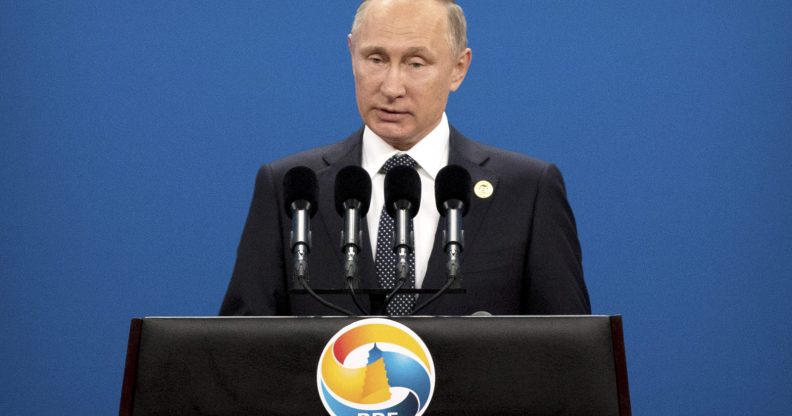Russian government defends ‘gay propaganda’ law after human rights ruling

BEIJING, CHINA – MAY 14: Russian President Vladimir Putin speaks during the opening ceremony of the Belt and Road Forum at the China National Convention Center (CNCC) in Beijing, Sunday, May 14, 2017. The Belt and Road Forum focuses on the One Belt, One Road (OBOR) trade initiative. (Photo by Mark Schiefelbein-Pool/Getty Images)
The Russian government has vowed to appeal against a European Court of Human Rights ruling over its gay ‘propaganda’ law.
In a ruling this week, the European court condemned Russia’s 2013 law which bans “propaganda of non-traditional sexual relationships” towards minors.
The law also bans people sharing “distorted ideas about the equal social value of traditional and non-traditional sexual relationships”, and has been widely abused in the country to clamp down on the LGBT rights movement as a whole.
In its ruling, the ECHR found the law to be in breach of freedom of expression protections, as well as ruling that it “reinforces stigma and prejudice and encouraged homophobia”.

Responding to the ruling, the Russian state has vowed to appeal.
Speaking to the press, Russian Foreign Minister Sergey Lavrov said he had not read the ruling.
He claimed: “On LGBT, we do not prosecute for this or that orientation.
“Many people have been complaining… I want to state once again what we have repeatedly stated: we have no persecution for any orientation in one area or another, including orientation in the sphere of LGBT.
“The only thing we don’t want and therefore ban by our law is the imposition of sexual orientations on underage citizens of Russia. Nothing more.
“And since we’ve touched upon the issue, you’re obviously concerned about it and this concern should certainly [include] all countries, and that’s why you can obviously compare.”
In a separate statement, the Russian Justice vowed to appeal the ruling.
In a statement, the department said the law was solely designed “to defend morality and children’s health”, and did not impact freedom of expression.
One of the country’s most notorious anti-LGBT lawmakers also condemned the ruling.
Vitaly Milonov, of Putin’s United Russia party, wrote: “The decision shows that our country has chosen the right path to preserve its culture and human identity.
“I’m sure that we will support the institution of a traditional strong family in future and shield children from attacks by all manner of minorities.”
The law has been used to call for everything from Pride events to video games to be banned.
Last year, Russian MPs called for football video game FIFA 17 to be banned because it allowed players to take part in the rainbow laces campaign.
A special Pride-themed football kit was made available as a free download for FIFA 17 players across PC, Xbox and Playstation gaming platforms as part of the tie-up.
Russia’s censorship body was urged by lawmakers to open a probe into the potential violation of the ‘gay propaganda’ law.

